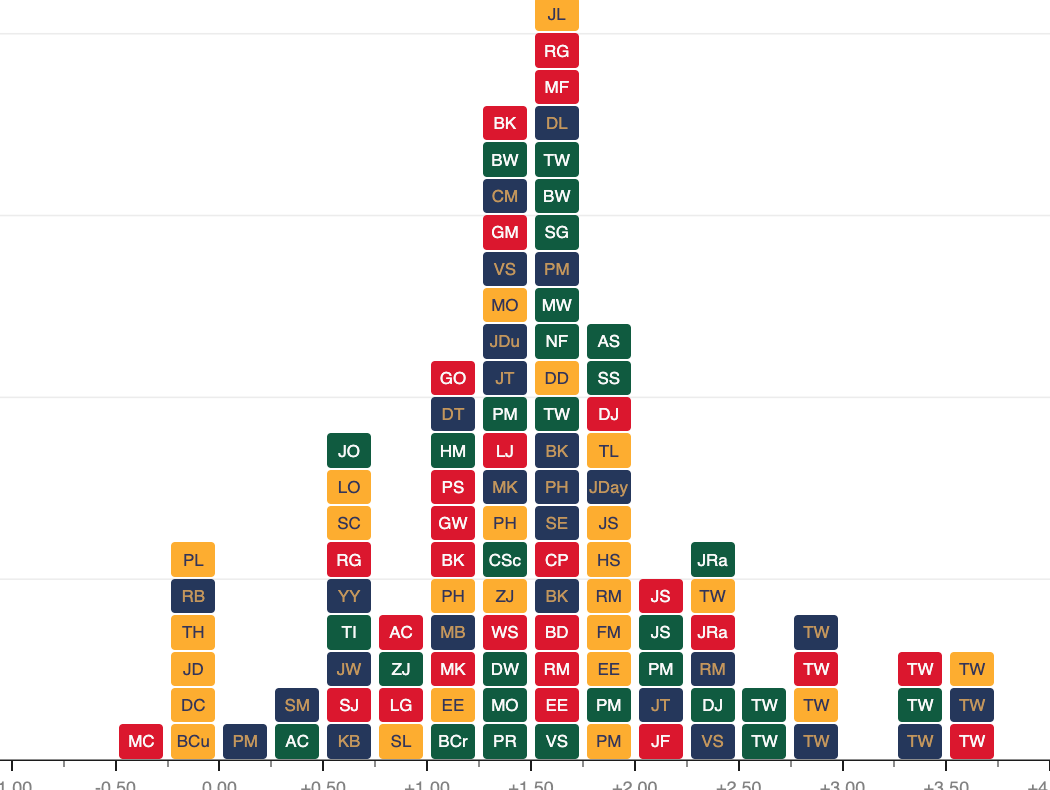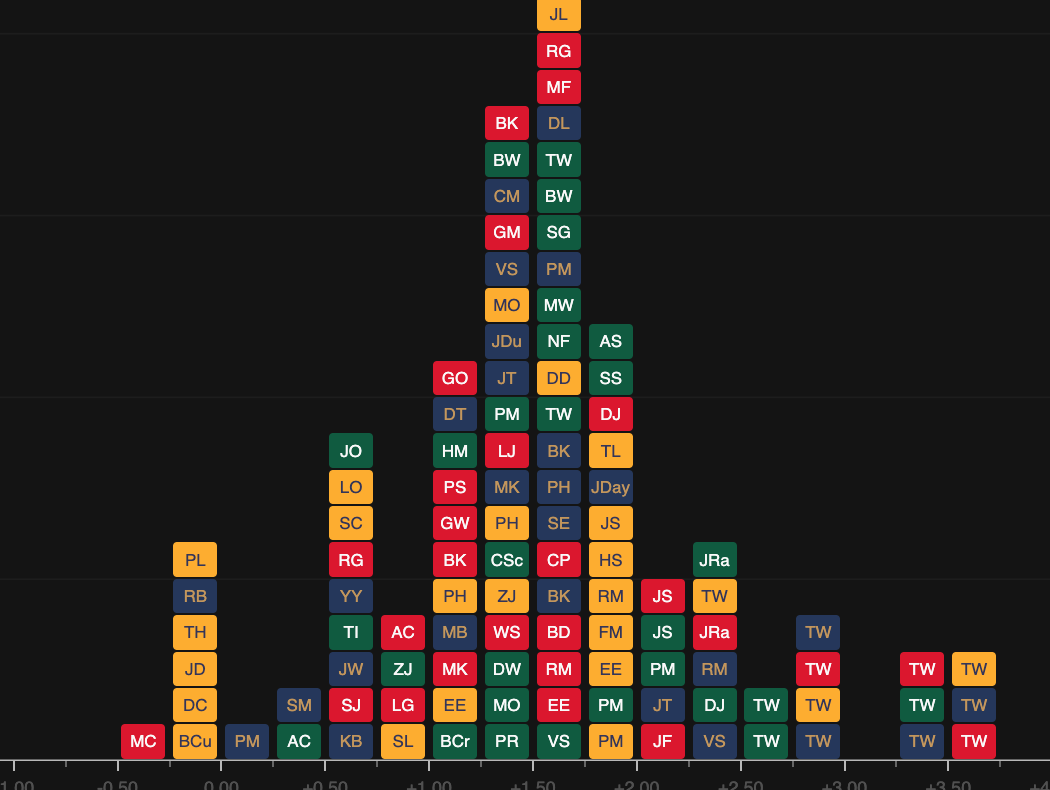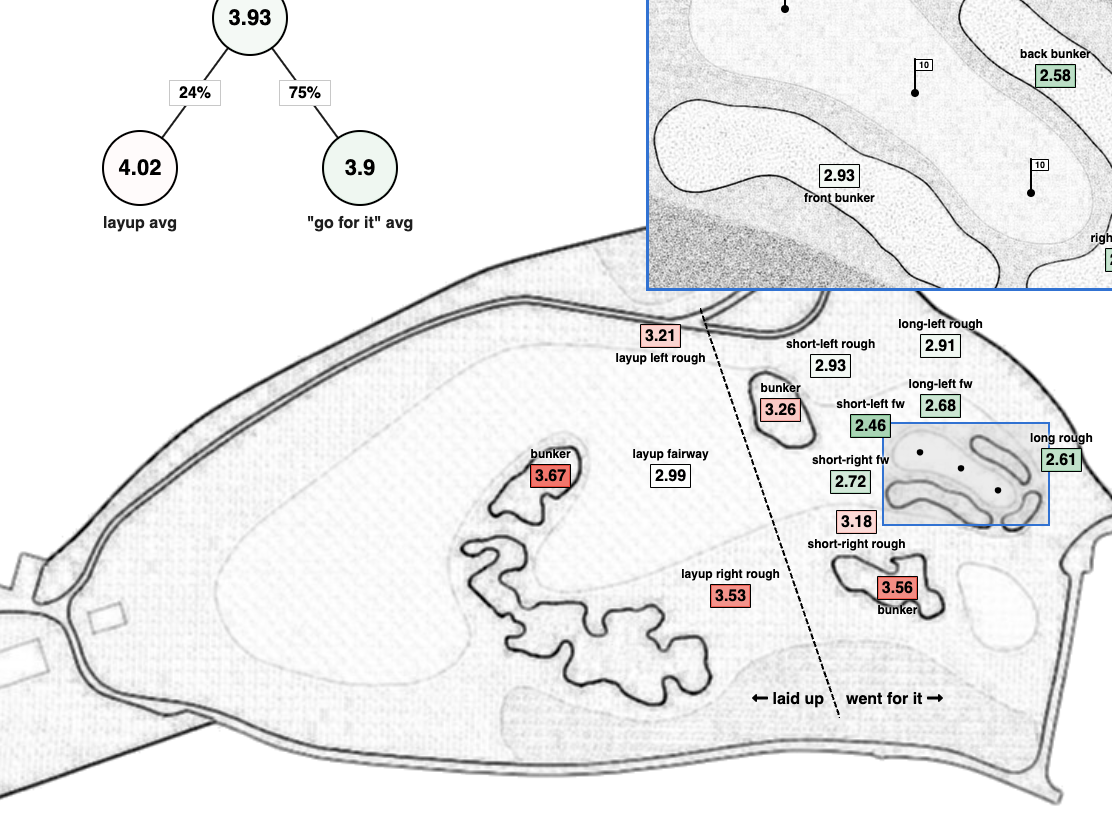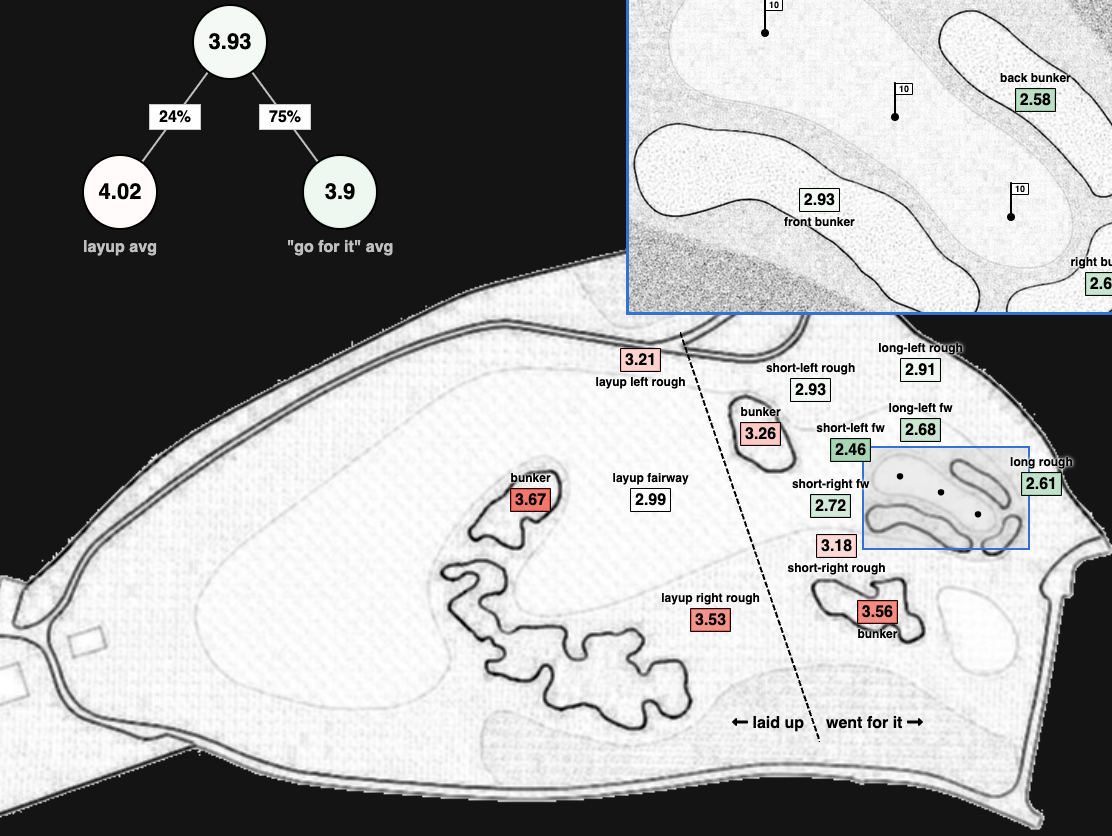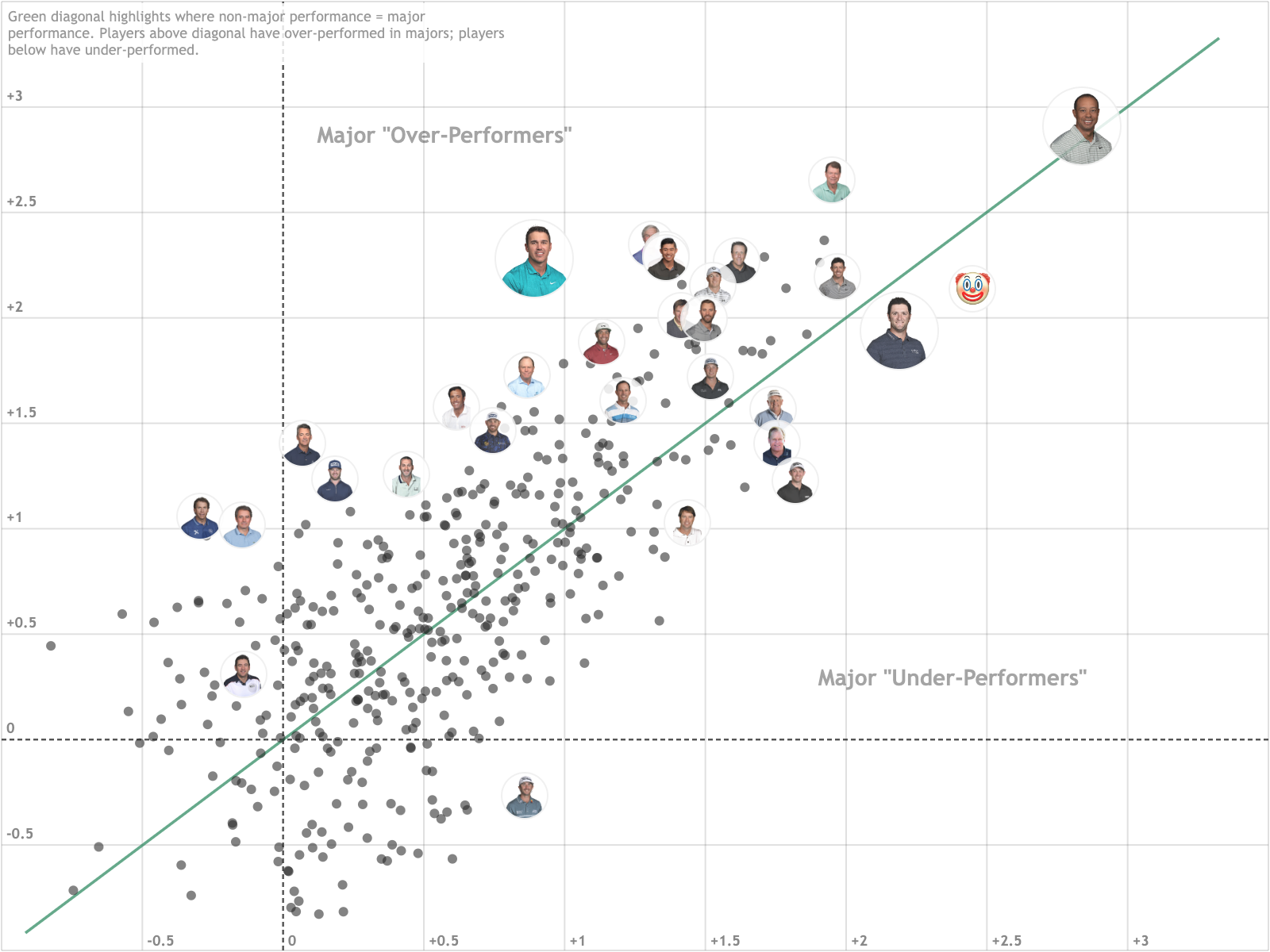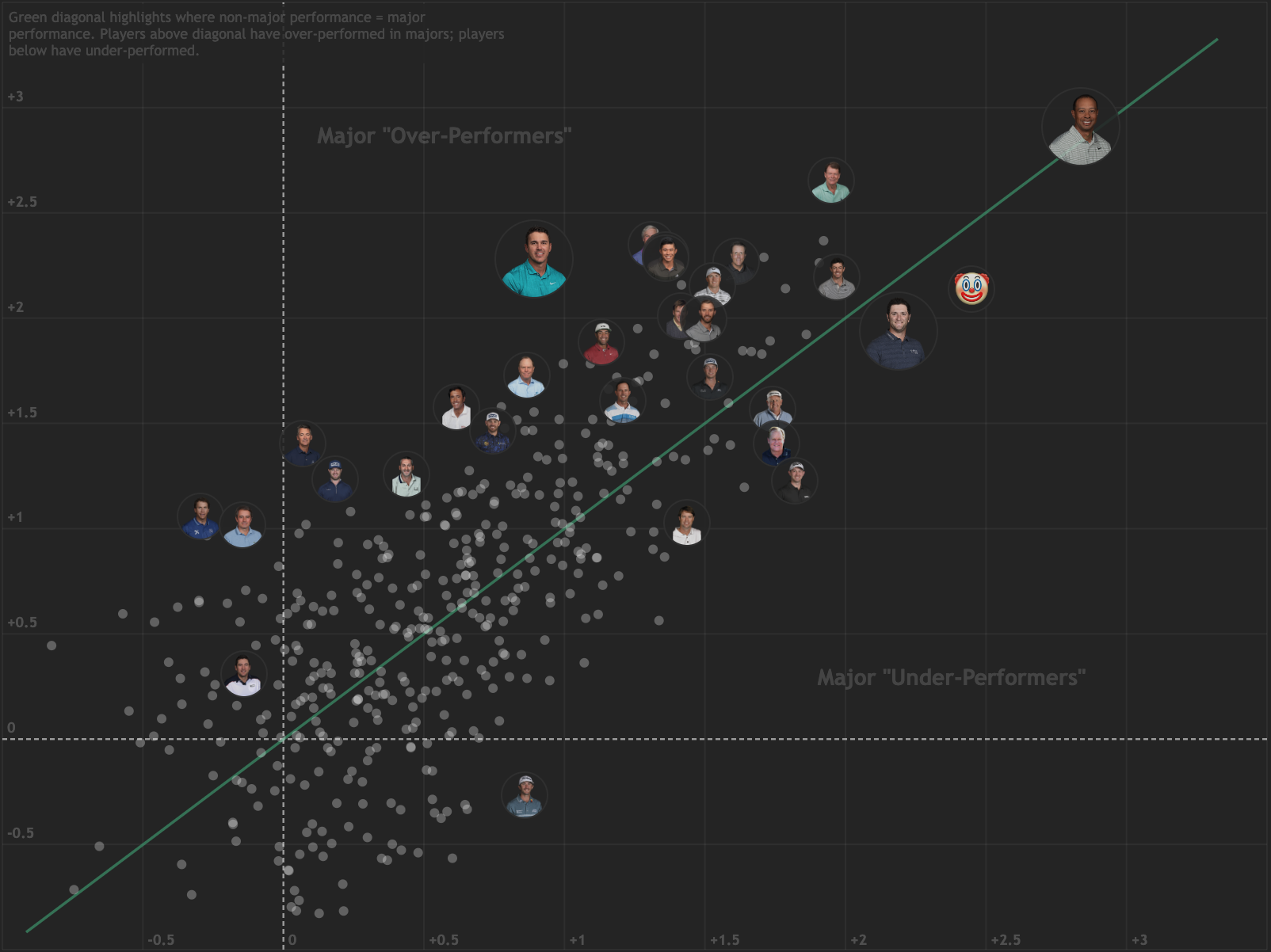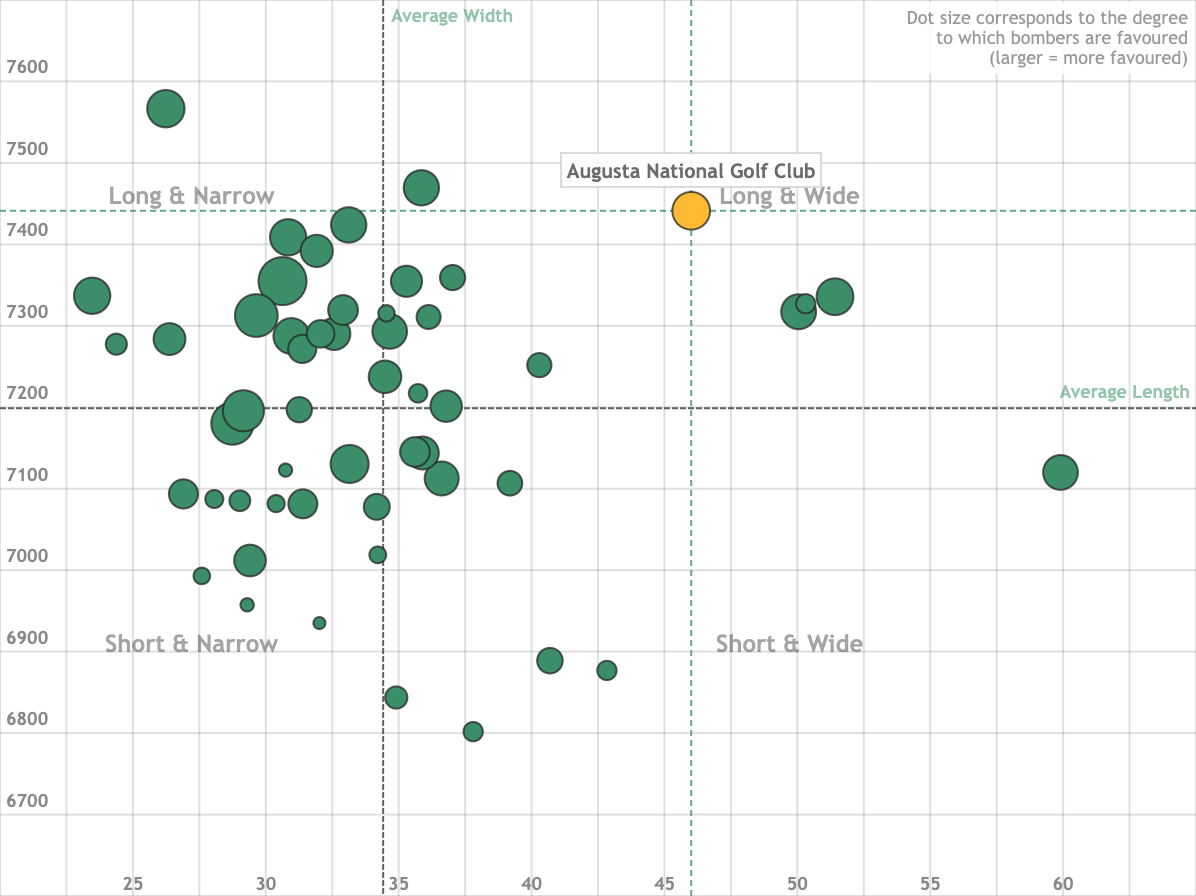
 I.T.N. No. 23
I.T.N. No. 23PUBLISHED November 14, 2020
Inside The Numbers ...
is a brief numerical summary of the current happenings in the world golf, published every Monday — hopefully.
68 STROKES
In 25,000 simulations of tomorrow’s final round, Dustin Johnson’s scores ranged from 61 to 89 (!).
Remember, 25k is a big number — weird things can and will happen in that many trips around Augusta National.
The plot below displays Dustin Johnson’s win probability as a function of his (possible) final round scores:
These probabilities reflect the uncertainty around the specific scores shot by the other golfers in the field.
To virtually guarantee a victory tomorrow, Johnson needs to shoot 68 or
better (we expect him to win more than 99% of the time in these cases). Conversely,
if Johnson shoots 77 or worse we expect a win less than 2.5% of the time.
It’s important to note that part of the uncertainty here lies in how difficult Augusta National plays tomorrow:
our expectation is a field scoring average of around 72.5, but we allow for the possibility of
easier or harder
average conditions. For example, if we know DJ shot a 77, this
increases the likelihood that the course played difficult (and therefore
also increases the likelihood that DJ’s pursuers shot a higher score).
This partly explains why his win probability is not lower for a final round score of 77.
If we wanted to ignore course difficulty, we could repeat this exercise but just focus on Johnson’s strokes-gained relative to the field. In this case, the relevant numbers would be +4 SG (greater than 99% win probability) and -4 SG (less than 0.5% win probability).
DJ's win probability conditional on what he shoots tomorrow
If we wanted to ignore course difficulty, we could repeat this exercise but just focus on Johnson’s strokes-gained relative to the field. In this case, the relevant numbers would be +4 SG (greater than 99% win probability) and -4 SG (less than 0.5% win probability).
40 MINUTES
Stepping onto the 2nd tee today, Dustin Johnson was co-leading the tournament at 9 under par.
At the time, our model gave him a respectable 17 percent chance of winning.
Over the next 40 minutes, DJ played three holes
that changed the complexion of the 2020 Masters Tournament:
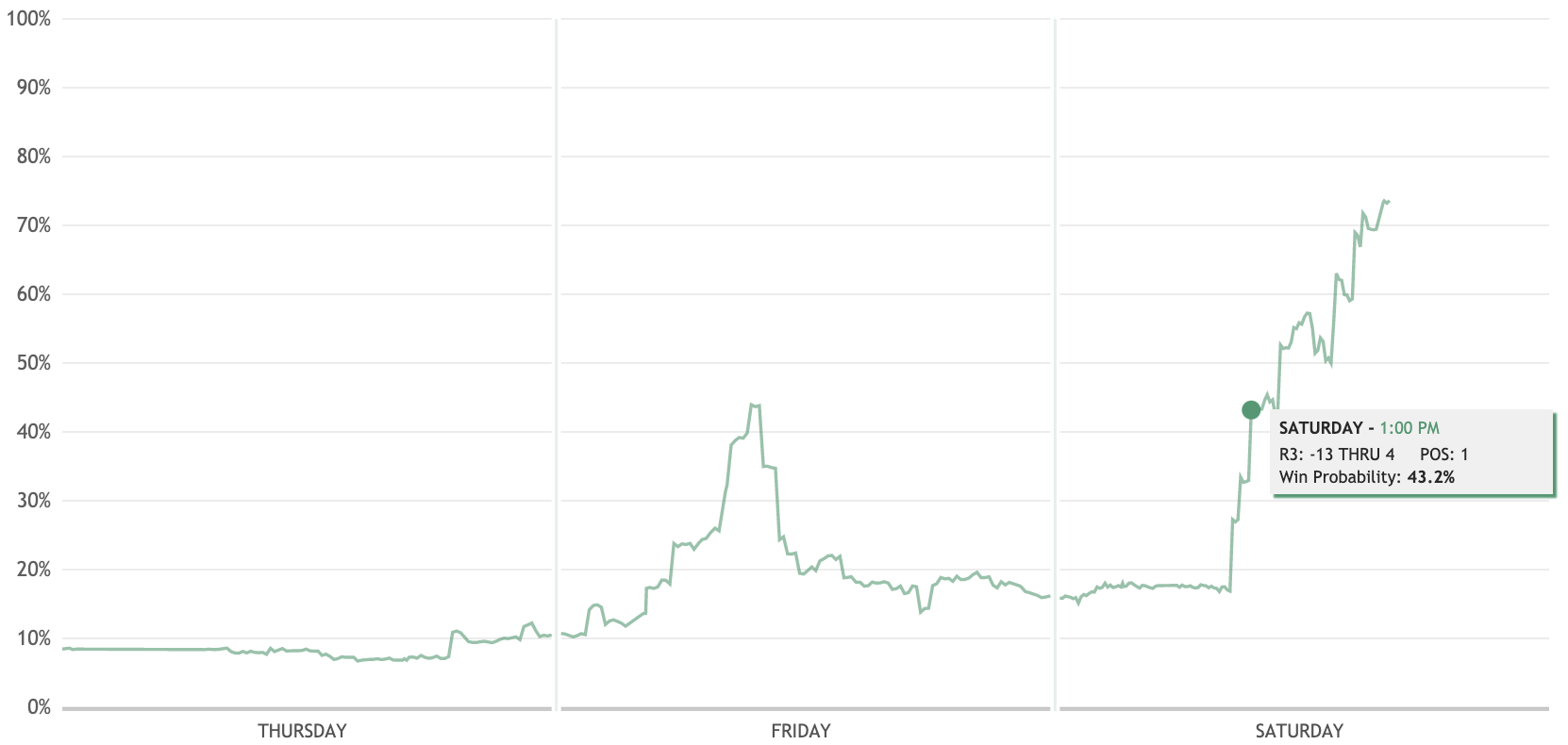
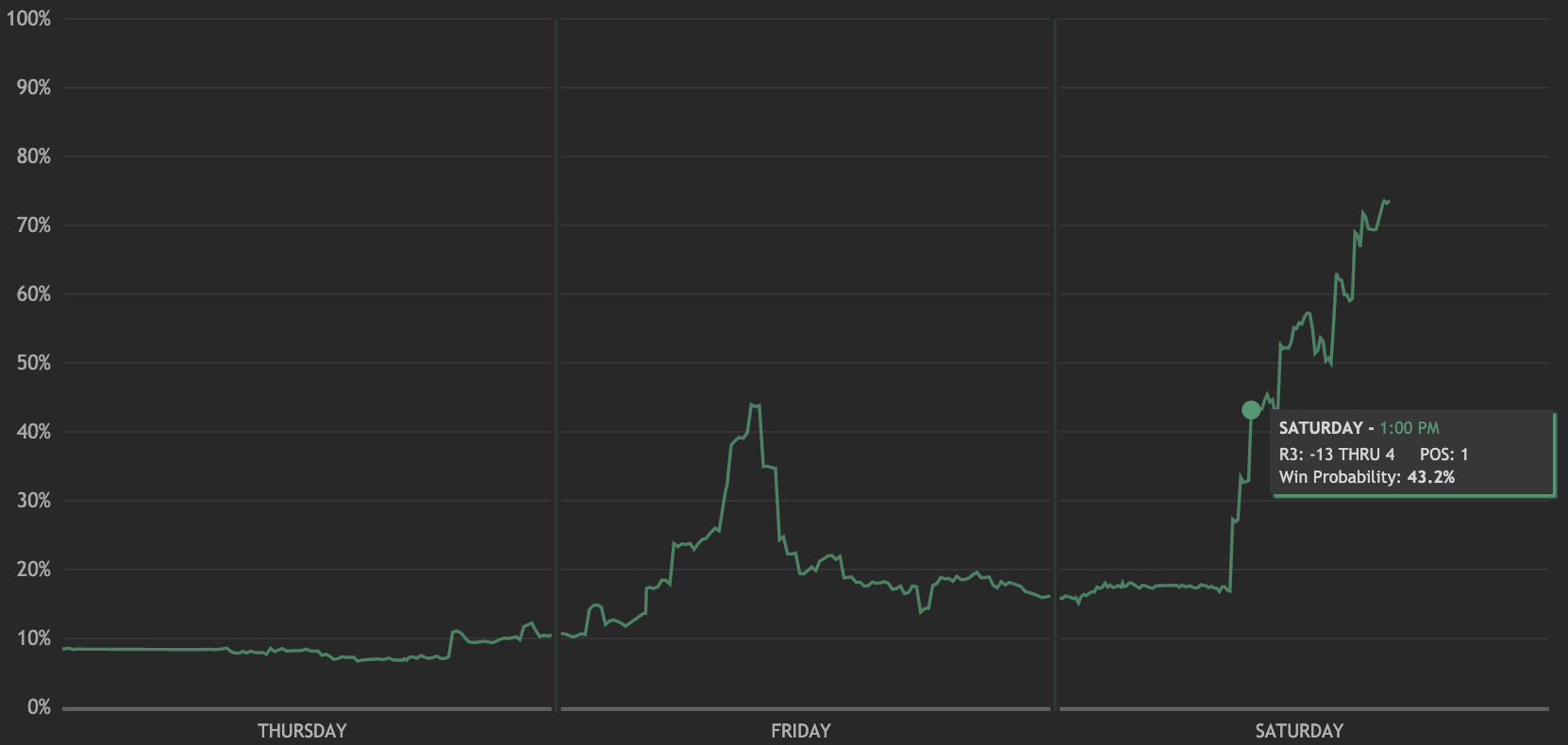 Johnson went eagle-birdie-birdie on holes 2-4, picking up 3.6 shots on the field and improving
his win probability to 43 percent. If Johnson dons the Green Jacket on Sunday —
the most likely outcome now — he will
likely look back at this 40-minute stretch as a major contributing factor.
Johnson went eagle-birdie-birdie on holes 2-4, picking up 3.6 shots on the field and improving
his win probability to 43 percent. If Johnson dons the Green Jacket on Sunday —
the most likely outcome now — he will
likely look back at this 40-minute stretch as a major contributing factor.


2.3 EXPECTED MAJORS
Dustin Johnson has entered the final round of a major championship in 5th place or better
12 times in his career. According to our model — which accounts for the skill of each golfer —
we expected him to accumulate 2.3 majors given these final round starting positions.
Once we take into account Johnson’s final round scores — while remaining uninformed about his competitors’ scores —
that expected win figure drops to just 1.2. Ultimately, we know DJ closed the deal in just 1 of these majors (the 2016 U.S. Open).
What’s our takeaway? Most of the discrepancy between Johnson’s expected majors based on his final round starting positions, and his actual major haul, is due to poor play on his part in final rounds. (This is the move from 2.3 expected wins pre-round to 1.2 after knowing DJ’s score.) However, Johnson has also gotten a bit unlucky — in the sense that his competitors played better than expected — to have only 1 major win. (This is the move from 1.2 expected wins to his actual win total of just 1.) This “bad luck” is basically concentrated in one tournament: the 2011 Open Championship. Johnson began that Sunday in solo second; based on his play that day, we expected Johnson to get the win 38% of the time. Ultimately it wasn’t close to enough, as final round leader Darren Clarke played well in difficult conditions to win by 3.
What’s our takeaway? Most of the discrepancy between Johnson’s expected majors based on his final round starting positions, and his actual major haul, is due to poor play on his part in final rounds. (This is the move from 2.3 expected wins pre-round to 1.2 after knowing DJ’s score.) However, Johnson has also gotten a bit unlucky — in the sense that his competitors played better than expected — to have only 1 major win. (This is the move from 1.2 expected wins to his actual win total of just 1.) This “bad luck” is basically concentrated in one tournament: the 2011 Open Championship. Johnson began that Sunday in solo second; based on his play that day, we expected Johnson to get the win 38% of the time. Ultimately it wasn’t close to enough, as final round leader Darren Clarke played well in difficult conditions to win by 3.
0.9 STROKES BELOW EXPECTATION
Since 2004, golfers entering the final round of a major championship
in one of the top two positions have, on average, performed
0.6 strokes below our model’s expectation. Shown below is
the full range of differences between actual and expected
performance as a function of final round starting position (along with a smoothed curve):
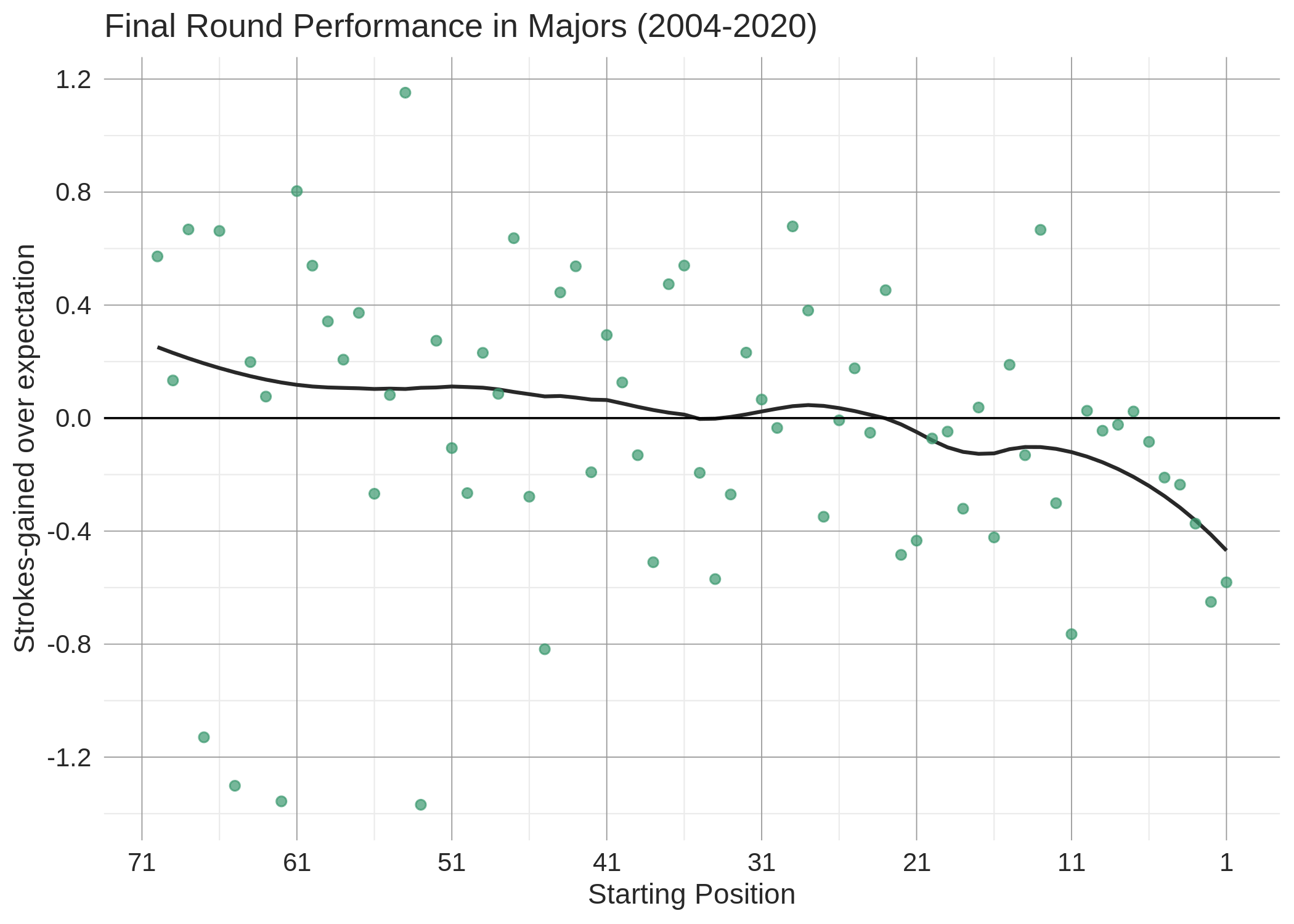
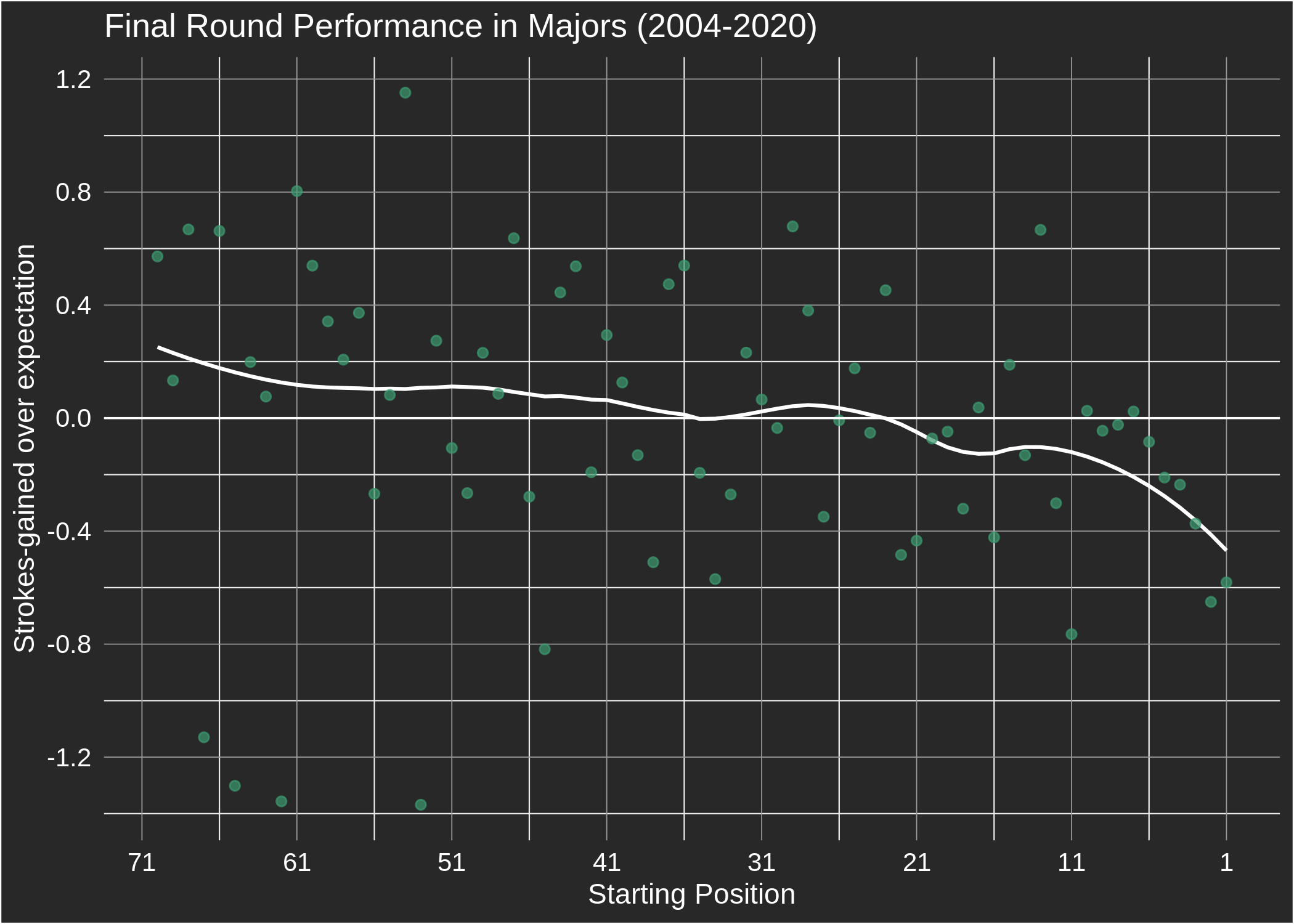 As detailed previously,
Dustin Johnson has entered the final round in fifth place or better on 12 occasions
throughout his career. Consistent with the underperforming we saw when
analyzing expected wins, Johnson has on average performed 0.9
strokes below expectation in these final rounds.
As detailed previously,
Dustin Johnson has entered the final round in fifth place or better on 12 occasions
throughout his career. Consistent with the underperforming we saw when
analyzing expected wins, Johnson has on average performed 0.9
strokes below expectation in these final rounds.
In forming our predictions for tomorrow’s final round, we docked DJ about 0.5 strokes compared to what we would predict in a ‘pressure-free’ situation. This is a compromise between the historical performance of final round leaders in majors (-0.6 relative to expectation), and the analogous value for final round leaders of PGA Tour events (-0.4). We don't make an additional adjustment for DJ (due to his worse final-round performances) due to the small sample size.


In forming our predictions for tomorrow’s final round, we docked DJ about 0.5 strokes compared to what we would predict in a ‘pressure-free’ situation. This is a compromise between the historical performance of final round leaders in majors (-0.6 relative to expectation), and the analogous value for final round leaders of PGA Tour events (-0.4). We don't make an additional adjustment for DJ (due to his worse final-round performances) due to the small sample size.
I.T.N. ARCHIVE
RECOMMENDED BLOGS
Recent Blog Posts
Model Talk Blog
Does our model overvalue leaders?

 Data Visualization Blog
Data Visualization Blog
Skill Distribution of Major Champions
